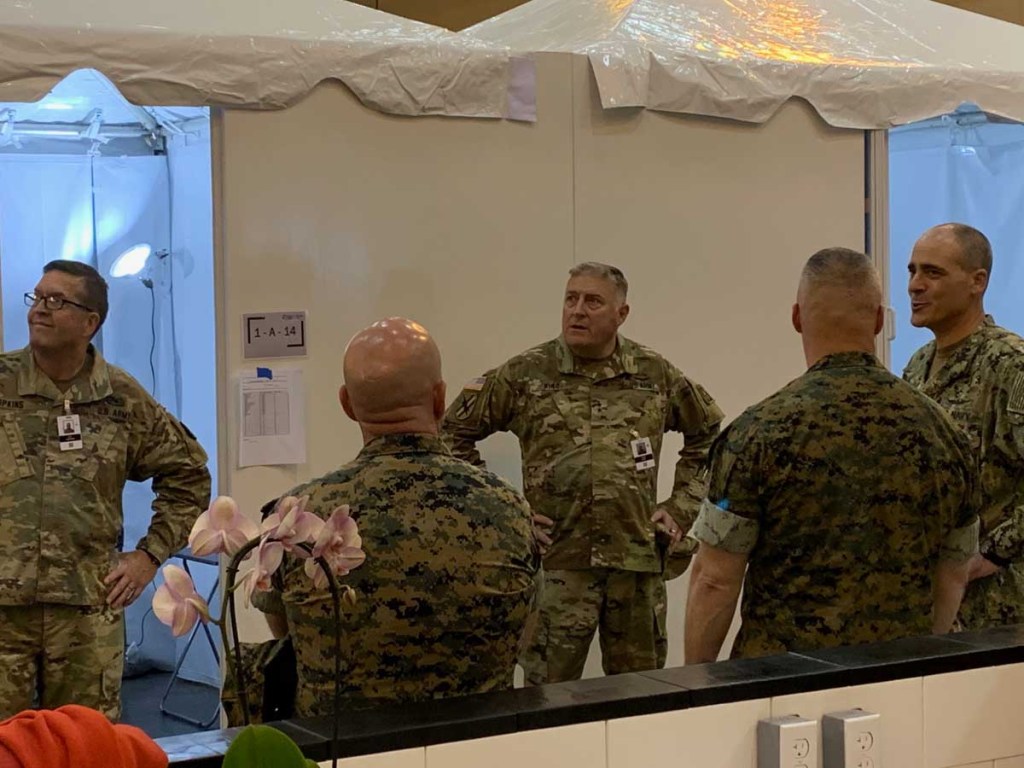Ga. Insurance Commissioner deployed in coronavirus fight
Published 2:00 pm Friday, April 10, 2020

- Insurance Commissioner John King (middle) joins thousands of National Guard troops deployed to assist in the COVID-19 emergency response.
ATLANTA — Thousands of U.S. Army National Guard troops have been deployed throughout all 50 states, helping with tasks from disinfecting nursing homes to building makeshift hospitals in convention centers.
One of them is Georgia Insurance Commissioner John King, a major general in the National Guard.
Starting at headquarters at Fort Sam Houston in San Antonio, in the past few weeks, King has made the trip to New Orleans transforming a convention center into a 2,000-bed hospital facility to relieve pressure from local hospitals. He is now doing the same thing in various parts of New Jersey.
The tasks take thousands of people working around the clock — contractors, military personnel and volunteers, he said.
“We haven’t seen anything like it in the United States,” he said. “Probably the last time we did mobilization like this was for World War II.”
For Georgia, King offers a unique look into the duality of the grim expectations of overcrowded hospitals and an uplifting message of the power of people coming together in the midst of a global health pandemic.
“Think of me as the scout out there, across the country looking at what works, what doesn’t work as well,” King told CNHI. “What options, what ideas are being used in other parts where this wave is farther ahead than Georgia, in order to take best practices and send it back to our team back there.”
The state of the pandemic changes by the minute. Georgia went form having its first reported cases March 3 to more than 11,000 by April 10. With increased cases, come increased deaths — with Georgia now reporting more than 400.
The volatile nature of the virus demands quick action, King said.
“We can’t just afford to shrink away from the challenge,” he said. “You have to have the mindset of we’re going to look at … best practices, we’re going to try them, and if they don’t work, we’re going to adjust — and adjust immediately.”
If the data isn’t showing mitigation of cases, King said, the strategy needs to change.
But the biggest challenge Georgia faces, he said, is identifying what area is in most need of additional facilities to house infected patients. Building extra capacity in the wrong place doesn’t help anyone.
Georgia has seen hot spots in both urban and rural areas — with probably the most notable case cluster in Albany, one of the hardest hit locations in the country. As of Friday, Dougherty County, with a population of about 89,000 people, had reported more than 1,000 of the state’s cases and 67 deaths.
A model frequently referenced by Gov. Brian Kemp and state health leaders shows Georgia reaching its peak hospital capacity April 23 — assuming Georgians stick to social distancing guidelines. At that point, all the state’s available medical resources could run dry, creating an ICU bed shortage in the hundreds.
King praised hospitals for rescheduling elective procedures and using other means of freeing up bed space. Every free bed, he said, is “one less bed we need to build somewhere else.”
As part of the Federal Emergency Management Agency’s national response, King said the National Guard has to be calculating when it comes to filling supply gaps for things in high demand but in limited supply, such as personal protective equipment.
“We have to be very careful that we make sure that we move these limited supplies to the right place,” he said. “Because if we put it in the wrong place, somebody else is going to have that need and it’s not going to be fulfilled.”
Parachuting into new areas, National Guard troops look to state and local leaders to get a better understanding of the needs of the community. The fire chief, the county commissioner, the mayor know best what needs to be done, he said.
“They know the needs better than anybody,” he said. “So we look for those gaps where they don’t have the capability.”
Kemp appointed King to the insurance and safety fire commissioner position July of last year making him the first Hispanic state official in Georgia history. Before, he served as the Doraville police chief.
In a statement, Kemp said King’s leadership is “invaluable” in Georgia’s fight against coronavirus.
“The real-time insight he offers will make Georgia better positioned to tackle and emerge from this crisis,” Kemp said. “As a member of the Coronavirus Task Force, he provides crucial information to aid in our decision-making, and I am honored to have him on the team.”
On the front lines, King said he remains optimistic, navigating a situation that has “no playbook.”
“This is what Americans do. This is what Georgians do. We rise to the challenge,” he told CNHI. “Sometimes we don’t give ourselves credit. We’ve confronted crises in the past that we’ve overcome. And we will overcome this. I’m convinced.”





